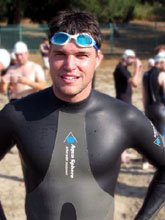So I was listening to a little of the NPR whilst navigating LA traffic this afternoon and heard an interesting interview: a very emphatic researcher has concluded that the recent surge in obesity can be attributed, in large part to our modern "food environment," that is, to the instant availability of a vast array of junk foods in all their highly-caloric and nutrient-deprived glory. It's not crumbling willpower or waning interest in exercise that's turning us all into fatties. Rather, it's the office doughnut tray, the candy bowl, the enticing sugar- and trans-fat laden goodies calling from the aisles of every convenience store, gas station, and greengrocer across the nation.
Think about it: as hunter-gatherers, we're programmed to eat when food is available. The mechanism (so effectively exploited by fast-food advertisers everywhere) which convinces us we're hungry at the very sights and sounds and smells of food, is innate and very tough to resist, and that's not any more true for us 21st-Century dwellers than for our ancestors. That impulse is there to keep us alive, after all. It tells us that when food is present, you'd best get eatin,' Mr. Bipedal Mammal, because Krishnu only knows when famine will strike.
So, like Pavlov's dogs, we salivate when the bell rings. Trouble is, bells are jangling in our ears virtually 24-7, convincing us that we're hungry when we're not, and THAT, the argument goes, is the true cause of the obesity epidemic.
At first glance, this seems like one of those Sociology 101-class theories that are equal parts obvious and fatalistic: Poverty is Societal! Racism is Institutional! Sexism is passed down through the generations! And Advertising Made You Fat, Fattie!
I was a Sociology minor back at the U of Virginia, and the weird appeal of these theories is that, like sci-fi, they're terrifying and oddly comforting at the same time. It sucks that racism exists and is perpetuated in part by vast mechanisms far beyond our control, but believing that also conveniently relieves us of the impetus to do anything about it. It's beyond our control, like the weather, so we might as well quit worrying about it and go play hacky-sack in the quad.
Several listeners called in to the NPR show to protest: "We still have the choice," they said, "we still have free will. So we can choose not to fall victim to the ubiquitous call of junk food."
And that's true: we CAN, and that's what the fitness industry is always exhorting us to do: resist. But above those well-meaning but tiny voices--mine included--the Siren call of appealing consumables swells ever louder, threatening to dash us all on cliffs made of Count Chocula.
So if we go with this idea that we're fatter now because of this change in our food environment (and that does seem like a more plausible argument than the more moralistic implication that the willpower has been miraculously bred out of us in two generations), where does that leave us? Do we just throw up our hands and have at those Krispy Kremes?
That's the path of least resistance, and judging from our ever-expanding waistlines, it seems to be the one that most of us are taking.
But then I got to thinking. If 'food environment' really is a factor--and there's really no harm in believing that it is--we just need to do what we can to control our it. We need to attack the problem at its root.
And to a large extent, you CAN control your food environment. The problem is most decidedly not lack of information. Pretty much everyone knows what's good for them and what's not. Sure, we can quibble over details, but I don't imagine there's too many Americans over the age of five that can't tell you the fruits and veggies are good and candy and cookies are bad. My clients, for instance, don't NEED more knowledge on what to eat and what not to eat, they need more practical strategies on dealing with the ubiquity of temptation.
So maybe fitness freaks need to go about things a little differently and spend less time on the minutia of refined sugars and omega-3 fatty acids (interesting and valuable as that information is), and more about practical things like the best brands of easy-to-carry food coolers and the route to take through the grocery store. In other words, practical ways to limit your exposure to the bad stuff and maximize your exposure to the good stuff. Most diet books, in my experience, will nod at these things but spend the lion's share of their verbiage on theory and formulae.
Responses?
Monday, January 14, 2008
Subscribe to:
Post Comments (Atom)




5 comments:
"My clients, for instance, don't NEED more knowledge on what to eat and what not to eat, they need more practical strategies on dealing with the ubiquity of temptation."
I totally agree. That has always been what made or broke my weight-loss/weight-control efforts. And worse than that, it's so very mood-based; stress or other strong emotions throw resistance out of whack. Techniques to even out emotion (meditation, exercise) along with the "best brand" info you mentioned, would be a win-win in improving people's health.
I constantly see people snacking out of the vending machines where I work, and there is not a healthy thing in there. Personally, I like to eat constantly all day, too. Rather than complain about the machine contents, my solution is to bring my own food to the office. Daily I bring a few single serving cheeses, yogurt, a few pieces of fruit, and a healthy lunch. I also bring a 3 lb bag of pecans or almonds and a big box of protein bars to the office every month or so as needed. With all these pretty healthy options sitting in front of me all day, it is much easier to eat well day-in and day-out.
The difficulty is planning - I need to go to Costco or wherever and get these foods, and then stuff them in my drawers. I have to pack a lunch bag daily, which means always having the cheeses and yogurt in stock at home. This is not rocket science but it does require a little planning.
Great post, as usual.
Living in Chile, I have seen the recent influx of fast foods (in the past year there have been scores of McDonald's, Pizza Hut, KFC, and Starbucks built) affect the people of this country. They used to have a very low obesity rate and now with the arrival of U.S. fast food chains, surprise, surprise, they now have the same % of obese adults as we do.
Very sad.
Planning is definitely in order! Again, we all know what's good and what's not, but when we're starving at work with only poor choices from the vending machines to tide us over, most good intentions go out the window. The three-pound bag of nuts; the protein bars, the packed lunch...great tools in the ongoing fight.
Quick story: I took my daughter to Disneyland recently and the place is now, shockingly, inundated with GREAT food choices: fruit and veggie snacks, good protein chioces, decent beverage choices, etc. Kind of amazing.
I realized later that everybody wins with that setup: parents are happier because their kids eat better and don't beg for crappy foods that aren't up in their faces every 20 feet, the kids are happier not having the sugar rush/crash and burn syndrome, AND the Disneyland execs are happier because there are fewer screaming kids around and fewer families having to leave early because of kids' meltdowns. Win, win, win. Candy and the like is available, certainly, but it seemed a lot less visible than the good stuff. I was shocked and amazed. Point for the Mouse.
Totally agree w. your excellent post!
I'm the type of person who forgets to eat. I'd just eat whenever the bell rang -either seeing the crap sitting out in the office kitchen, or the Carl's Jr. on the road.
I wasn't totally overweight, but my body was pretty unhealthy: extremely high cholesterol, headaches, mild memory issues, lightheadedness, etc.. At a regular check-up, my MD was as alarmed by the IRREGULARITY of my snacks as by the crappy drive thru's from whece they came. -Frustrating, b/c I didn't think I had the time or resources to accomodate the sexy, leotarded, low-cholesterol "lifestyle" I'd seen on TV. In lieu of spandex, I bought myself a carton of fake eggs.
At my MD's suggestion, I also stocked my car with boxes of granola bars, and my desk with low-sodium chicken soup packets. Ate those whenever I felt like it. -Or when I saw a Carl's Jr.
My next cholesterol check was so low that my dad, also a physician, suspected I'd stopped eating altogether. I was actually eating a lot more, but it was all much leaner, meaner stuff.
I managed to get control over my cholesterol & inadvertently lost a belt loop or two in the process.
Controlling the environment was everything, because if it's just me against the Carl's Jr., Carl wins every damn time.
Post a Comment